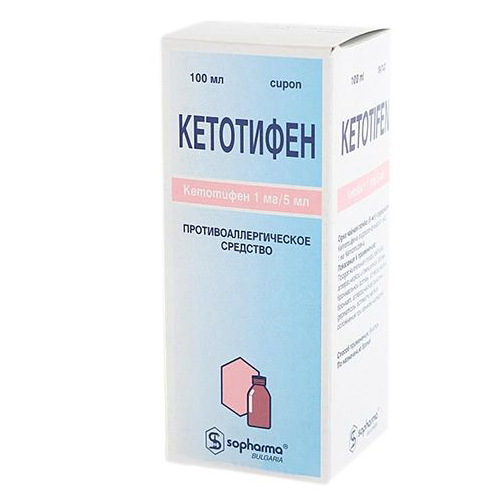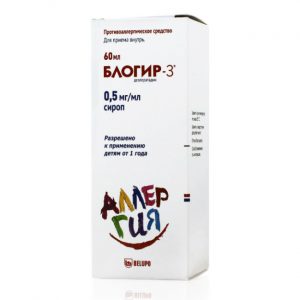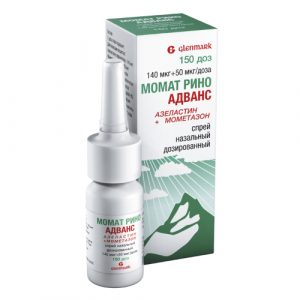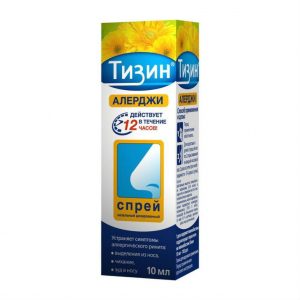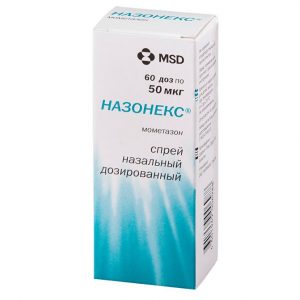Description
Release form
Syrup.
Packing
Bottle 100 ml.
Pharmacological action of
Ketotifen has a pronounced antihistamine, slightly antiserotonin effect, without anticholinergic effect. At higher doses, it has a slightly inhibitory effect on the central nervous system.
Pharmacodynamics
The mechanism of action of Ketotifen is associated with the ability to inhibit the release of histamine and other inflammatory mediators from mast cells due to membrane stabilization and also due to blockade of histamine H1 receptors. Ketotifen inhibits the phosphodiesterase enzyme, resulting in increased levels of cyclic adenosine monophosphate in mast cells.
The drug reduces or inhibits the reaction of the skin and bronchi caused by the antigen, which causes its use for prophylactic purposes. When used as monotherapy does not stop asthma attacks, but leads to a decrease in the number, duration and intensity of these attacks, and in some cases they completely disappear.
Reduces eosinophilia, reduces the need and frequency of use of anti-asthma drugs: corticosteroids, bronchodilators, etc.
Pharmacokinetics
The drug is characterized by good and rapid resorption, without the danger of cumulation in the body. Bioavailability is approximately 50%, which is associated with metabolism during the first passage through the liver. The time to reach maximum plasma concentration is 2-4 hours, and binding to plasma proteins is 75%. Excretion from the body proceeds in two phases, and within 48 hours with the urine the main part of the taken single dose is excreted. The therapeutic effect develops after 2 weeks of the course of taking the drug.
Indications
Atopic bronchial asthma, allergic rhinitis,
allergic conjunctivitis, pollinosis (hay fever)
Ketotifen Sofarma effectively prevents attacks of bronchial asthma, other manifestations of allergic reactions immediate type 5 acute bronchitis hay fever (hay fever)
Ketotifen Sofarma effectively prevents attacks of bronchial asthma, other manifestations of allergic reactions immediately flax type
Contraindications
There are no absolute contraindications. You should not take the drug during pregnancy, while taking oral antidiabetic drugs, which can lead to thrombocytopenia with sedatives and alcohol. Hypersensitivity to the components of the drug.
Pregnancy and lactation
Although animal studies have not shown any effect on pregnancy and peri- and postnatal development when Ketotifen is administered in doses that were tolerated by animals, its safety in humans has not been established. Therefore, during pregnancy, Ketotifen can be prescribed only in cases of emergency.
It is believed that ketotifen is also excreted in human breast milk, so mothers taking Ketotifen should not breast-feed.
Special instructions
With pronounced sedative effects, 0.5 mg 2 times a day is prescribed in the first two weeks.
Ketotifen is not intended to relieve an attack of bronchial asthma. At the beginning of long-term treatment with ketotifen, the anti-asthmatic symptomatic and prophylactic drugs used by patients should not be immediately abolished: previous therapy with beta-adrenergic agonists, glucocorticoids, ACTH. Treatment with Ketotifen is stopped gradually, within 2-4 weeks (a relapse of asthmatic symptoms is possible). This is especially true for systemic glucocorticoids (prednisone, polcortolone, dexamethasone) due to the possible presence of adrenal insufficiency in steroid-dependent patients, since it may take up to 1 year to restore the function of the pituitary-adrenal system and its normal response to stress.
In patients taking ketotifen and oral antidiabetic drugs, platelet count in peripheral blood should be monitored.
Considering that Ketotifen may cause a decrease in the threshold of convulsive readiness, caution should be exercised when prescribing it to patients with a history of epilepsy.
Composition of
5 ml syrup contains: active ingredient:
ketotifen hydrofumarate 1.38 mg (corresponding to 1 mg ketotifen).
excipients:
sorbitol methyl parahydroxybenzoate
propyl parahydroxybenzoate
citric acid monohydrate
sodium hydrogen phosphate dodecahydrate
ethanol 96%
sodium saccharinate sludge flavor
Dosage and Administration
Inside, with meals.
Adults – 5 ml of syrup 2 times a day (morning and evening). For patients who have significant sedation, a slow increase in dose is recommended during the first week, starting with 0.5 mg (2.5 ml of syrup) in the evening before bedtime, until the therapeutic dose is gradually achieved.
For children over 3 years old – 5 ml of syrup 2 times a day (morning and evening) from 6 months to 3 years – 2.5 ml of syrup (0.5 mg) 2 times a day, morning and evening.
Duration of treatment. The treatment is long therapeutic effect is achieved after several weeks of therapy. Treatment should be carried out for at least 2-3 months, especially in patients who did not have an effect in the first weeks. Ketotifen treatment should be discontinued gradually, over a period of 2–4 weeks.
Side effects
At the beginning of treatment, sedation is possible, less often – dry mouth and slight dizziness, but, as a rule, these phenomena disappear on their own with continued treatment. Sometimes, especially in children, symptoms of CNS irritation were noted, such as agitation, increased irritability, insomnia, and irritability. There are very rare reports of seizures during treatment with ketotifen. There are reports of weight gain (may increase appetite).
There are rare reports of cystitis observed with Ketotifen. In very rare cases, an increase in the activity of liver enzymes and the development of hepatitis are possible. There are reports of individual cases of severe skin reactions (erythema multiforme, Stevens-Johnson syndrome) approximate frequency of occurrence – 1 case per 2 million patients receiving ketotifen.
Drug Interactions
Ketotifen may enhance the effects of drugs that have a depressing effect on the central nervous system – sedatives, hypnotics, as well as antihistamines (suprastin, tavegil) and alcohol.
Rare cases of a reversible decrease in platelet count with the simultaneous use of Ketotifen and oral antidiabetic drugs have been noted.
Against the background of the use of Ketotifen, the patient’s need for sympathomimetics and anti-inflammatory drugs (GCS, cromolyn sodium, nedocromil sodium) may decrease.
overdose
The main symptoms of an acute overdose: drowsiness, down to depression of consciousness confusion and disorientation of tachycardia and arterial hypotension especially in children – increased excitability, convulsions reversible coma.
Treatment is symptomatic. If taken recently, gastric lavage is indicated. Activated charcoal may be useful. If necessary, symptomatic treatment and monitoring of the functional parameters of the cardiovascular system is performed. In the case of seizures, the use of anticonvulsants (in particular, benzodiazepine derivatives) is indicated. Dialysis is ineffective.
Storage conditions
Store in a dark place at 5 C to 15 C.
active substance
ketotifen
Terms leave through pharmacies
In retseptu
Medicinal form
oral solution for
Prescription
For adults prescribed by a doctor, For children prescribed by a doctor, Pregnant II and III trimester as prescribed by the doctor, Children older than 6 months
